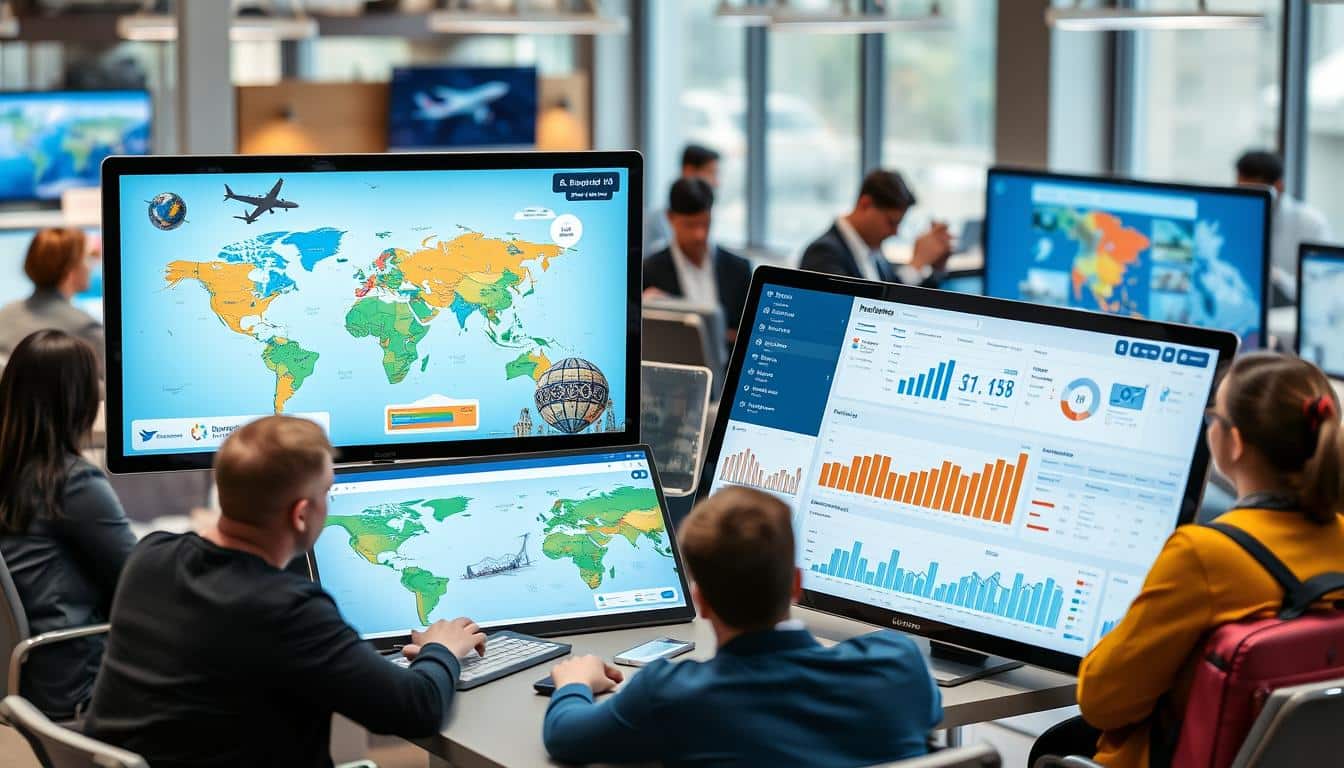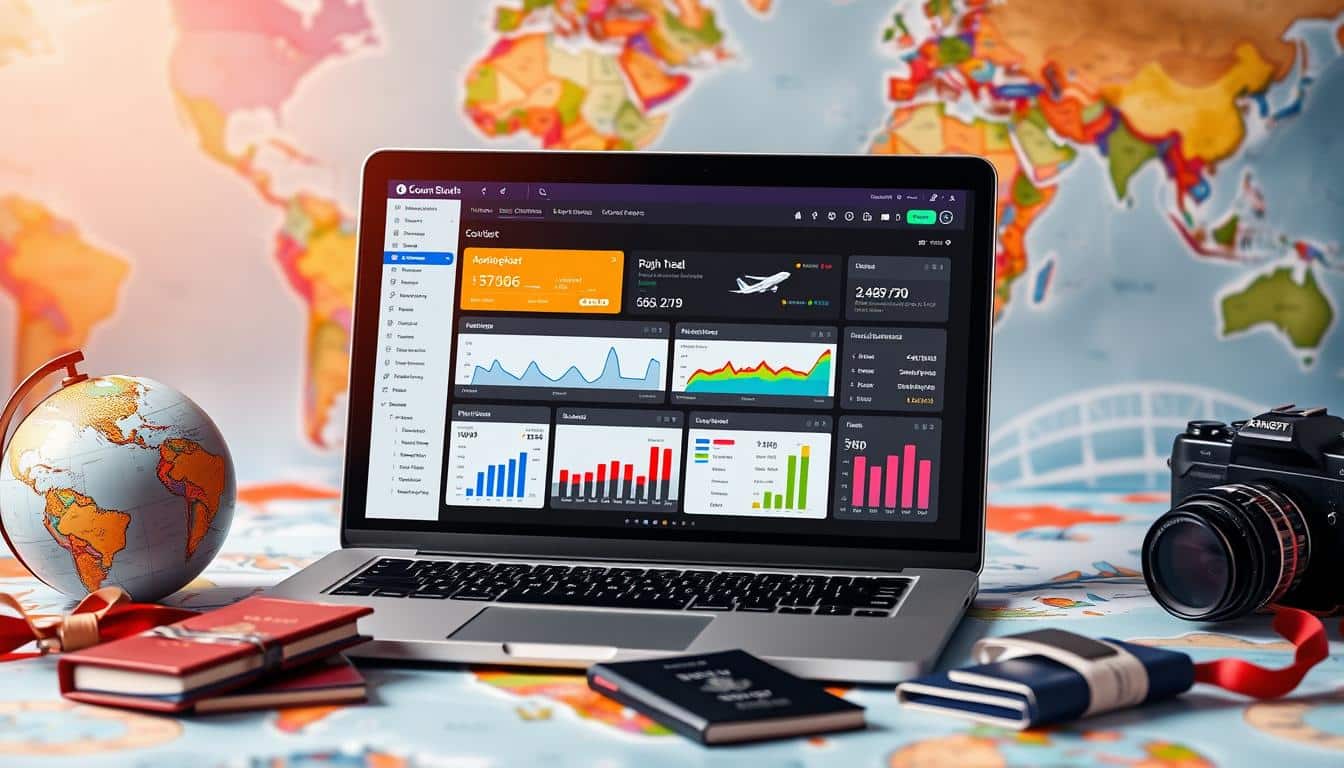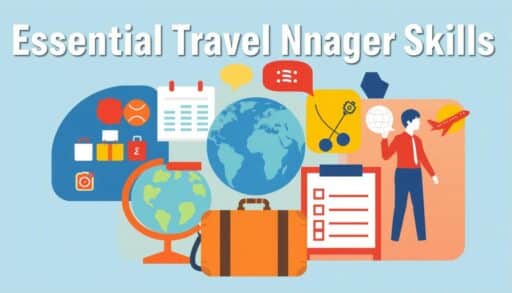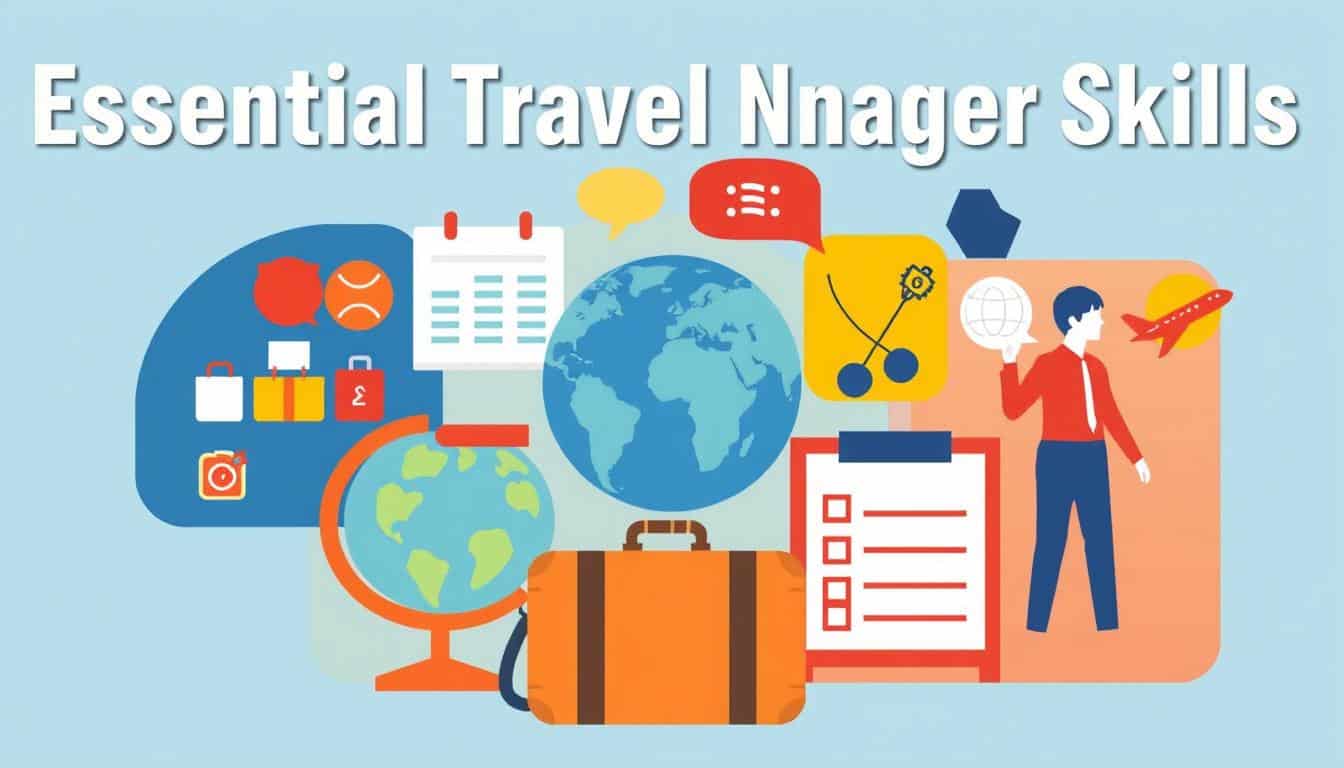The role of a travel manager is more important than ever. They handle corporate travel, manage policies, keep employees safe, and cut down on travel costs. To do well, they need a wide range of skills. This article will look at the key skills for a travel manager, including leadership, industry knowledge, and more.
Key Takeaways
- Travel managers are key in managing corporate travel, following policies, and saving on travel costs.
- To succeed, travel managers need skills like leadership, industry knowledge, and communication.
- Knowing the travel industry well, using travel platforms, and staying updated on trends are important.
- Good communication and negotiation skills help travel managers work well with others to find the best travel options and save money.
- Travel managers also need to be good with money, managing budgets and following policies to keep travel costs low.
Managerial and Leadership Skills
Travel managers need strong skills to succeed in the fast-changing travel world. They must be good at crisis management. This means they can handle emergencies like flight cancellations or natural disasters well.
They also need to manage people well. This includes making sure everyone has a good travel experience and follows the rules. Good communication and teamwork are key to success here.
Travel managers also have to work well with others. This means building strong relationships with clients, vendors, and partners. Their ability to solve problems and provide great service is crucial for their success.
“The true sign of a successful travel manager is their ability to anticipate and mitigate potential issues, while fostering a positive, collaborative environment for their team and clients.”
Travel managers with the right skills can handle the industry’s challenges. They keep clients safe and happy. And they make sure their travel programs do well.
Industry Knowledge and Trends

The travel industry is always changing. Travel managers need to keep up with new trends and tools. Understanding travel management platforms, like Global Distribution Systems (GDS), is key. These platforms help manage corporate travel by offering a wide range of services.
Travel managers should also know about new trends. This includes online booking tools, duty of care, and the need for sustainable and bleisure travel. Online booking tools make it easier for travelers to plan their trips. Duty of care is important for ensuring the safety of business travelers.
Travel Management Platforms
Global Distribution Systems (GDS) are at the heart of travel management. They give travel managers a full view of travel options. This makes booking and managing trips more efficient.
Emerging Trends
- Rise of online booking tools: Travelers like the ease of online booking platforms. They can plan their trips on their own.
- Duty of care considerations: Travel managers must keep their business travelers safe. They need to know about global security risks.
- Sustainable and bleisure travel: More people want to travel sustainably and mix work with leisure.
- Travel data analytics: Using data to improve travel policies and experiences is key for travel managers.
Travel managers who stay current with industry trends can make better policies. They can use new technologies to improve travel experiences for their employees.
Communication and Negotiation Abilities

Travel managers need top-notch communication skills and negotiation prowess. They must talk well with many people, like employees, travel agencies, and vendors. Good communication helps them solve travel problems, follow travel policies, and build strong ties with travel suppliers and agents.
They also use their negotiation abilities to get good deals and save on travel costs. Travel managers are great at working with different people. They use their language skills and cultural awareness to talk with clients and partners from all over. This way, they make sure everyone is happy and things go smoothly.
| Communication Skills | Negotiation Skills |
|---|---|
| Active listening | Persuasion |
| Clear and concise expression | Problem-solving |
| Adaptability to cultural differences | Creativity |
Travel managers are experts at talking and negotiating. They handle the tough parts of the job well. They keep travel costs down and follow travel policies. They also keep good relationships with vendors and make sure employees are happy.
Financial Acumen

Successful travel managers have a strong grasp of finance. They manage travel budgets and expenses well. They make sure travel policy compliance is followed, checking expenses for any mistakes. Their financial skills help the company’s financial health.
Travel Policy Compliance
Travel managers are key in following travel policy compliance. They watch and check travel expenses to make sure they follow the rules. They use strong auditing to find and fix any spending that’s not allowed. This helps keep travel spending in check and controls costs.
Budgeting and Cost Control
Travel managers also need to be good at budgeting and cost control. They create travel policies that meet needs but are also cost-effective. With their financial knowledge, they find ways to cut travel expenses and improve travel cost optimization. This helps the company’s finances.
| Key Financial Skills for Travel Managers | Benefits of Strong Financial Acumen |
|---|---|
|
|
“Visual communication, such as using visually appealing travel policies, can increase a person’s willingness to comply with guidelines by up to 80%.”
Travel managers with strong financial acumen are crucial for the success of corporate travel. They help keep the program financially stable and successful.
Travel Manager Skills
The role of a travel manager is key in today’s fast-changing business world. They need to lead and manage well. They also must know the Global Distribution System (GDS) and make smart decisions.
Global Distribution System (GDS)
Travel managers must be good with GDS systems like Sabre, Amadeus, and Galileo. These tools help them book travel efficiently and save money. They learn to find the best deals for their company by understanding GDS well.
Analytical and Decision-Making
Travel managers need to be good at analyzing data. They look for ways to improve travel and make smart choices. This helps them make the company’s travel better and cheaper.
In today’s quick business world, analyzing data and making smart choices is crucial. Knowing GDS helps them book travel better, save money, and make the company’s travel program successful.
Technical Proficiency

Travel managers need to know how to use the latest tools and technologies. They must be good with online booking systems and travel management software. These skills help automate travel plans, follow travel policies, and manage expenses.
Online Booking Systems
Travel managers who know how to use online booking systems can make booking easier. They can also make sure employees follow the company’s travel rules. These systems help track data and choose the best suppliers.
Travel Management Software
Travel managers use software to manage travel data, expenses, and programs. This software helps track expenses, enforce travel policies, and analyze data. It helps them make better decisions for the company’s travel needs.
| Technical Skills | Importance |
|---|---|
| Online Booking Systems | High |
| Travel Management Software | High |
| Travel Automation | High |
| Travel Policy Compliance | High |
| Travel Expense Management | High |
| Travel Data Analytics | High |
| Travel Program Optimization | High |
Using these technologies, travel managers can make things more efficient. They can improve the travel experience for employees and provide insights to help the company’s travel program.
If you’re looking for exciting jobs in New York, particularly in the travel industry, there are numerous opportunities for those interested in manager jobs in New York, especially as a travel manager. A travel manager is responsible for overseeing the company’s business travel and ensuring a seamless travel experience for business travelers, which includes managing the company’s travel policy and travel expenses. To become a corporate travel manager, one must possess excellent communication and organizational skills, as well as relevant travel experience. Many travel managers use online travel platforms and collaborate with travel agencies and travel management companies to create efficient travel arrangements that cater to the travel needs of employees. The travel manager job description typically includes responsibilities such as planning itineraries, providing advice on setting corporate travel policies, and ensuring cost-effective travel solutions for the company’s travel program. The average salary for a travel manager in New York can vary based on experience and the specific demands of the role, but it often reflects the lucrative nature of the industry, particularly in global and luxury travel sectors. For those interested in this career path, resources like indeed.com can provide job post details and insights into the types of travel manager roles available, including positions in companies of all sizes, from corporate giants like Marriott to smaller firms. Read on to learn more about the best practices for excelling in a travel management career and the essential skills required to hone your abilities in this dynamic field.
Also Read : What Is Student Travel Insurance And Why Do You Need It?
Conclusion
The role of a travel manager is complex and requires many skills. They need to be good leaders and know the travel industry well. They also need to be tech-savvy to manage travel plans effectively.
Travel managers must ensure travel policies are followed and help save money for the company. By improving their skills, they can become key players in their companies.
Travel managers earn around $89,859 a year. Companies like Marriott and Hilton pay up to $110,000. Those with degrees in Hospitality Management can get into top travel jobs.
Skills like being organized, good at talking, and negotiating are crucial. Knowing travel laws and trends is also important.
Travel managers make travel plans better for companies. They reduce risks and save money. Using tools like Engine can cut costs by up to 60%.
They also reduce paperwork costs by over $100 per trip. Travel managers who keep up with new technologies can add great value to their employers.
FAQs
Q: What is the job description of a travel manager?
A: The travel manager job description typically includes responsibilities such as planning and coordinating travel arrangements, managing corporate travel policies, and ensuring compliance with the company’s travel guidelines. They are also responsible for negotiating rates with travel services and vendors, and monitoring travel expenses.
Q: What are the responsibilities of a travel manager?
A: The responsibilities of a travel manager include overseeing business travel arrangements, managing relationships with travel agents and vendors, ensuring that trips align with the company’s travel policy, and providing support to employees during their trips. They also analyze travel data to optimize travel programs and streamline processes.
Q: What skills are essential to become a travel manager?
A: To become a travel manager, essential skills include strong organizational skills, negotiation abilities, excellent communication, attention to detail, and the capability to manage budgets and expenses effectively. Familiarity with travel services and technology is also important.
Q: What is the average salary for a travel manager?
A: The average salary for a travel manager can vary depending on location and experience, but according to industry standards, the salary typically ranges from $60,000 to $100,000 annually. Luxury travel managers may earn higher salaries due to the specialized nature of their work.
Q: What types of travel managers exist in the industry?
A: There are several types of travel managers, including corporate travel managers who focus on business travel, events managers who plan travel for corporate events, and luxury travel managers who handle high-end travel arrangements. Each type requires specific skills and knowledge related to their niche.
Q: What is included in a full job description for a travel manager?
A: A full job description for a travel manager typically includes duties such as developing travel policies, managing travel budgets, coordinating travel logistics, building relationships with travel service providers, and conducting travel audits. It may also outline required qualifications and preferred experience.
Q: How can I become a corporate travel manager?
A: To become a corporate travel manager, you should gain relevant experience in travel services or hospitality, develop strong organizational skills, and understand corporate travel policies. Pursuing certifications in travel management can also enhance your resume and job post details.
Q: What tools or resources can help in managing corporate travel?
A: Various tools and resources can assist in managing corporate travel, including travel management software, expense reporting tools, and online travel platforms. Networking with travel agents and utilizing resume resources can also provide insights into best practices in travel management.
Q: What are some common job post details for travel manager positions?
A: Common job post details for travel manager positions include a summary of the job description, required qualifications, skills needed, expected salary range, and information about the company’s business travel policies. They may also highlight the need for experience in corporate travel management.


